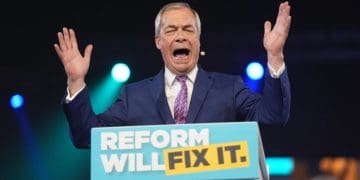The Labour Party quietly dropped plans to increase the digital services tax shortly after Jonathan Reynolds, the then-shadow business secretary, accepted free tickets to Glastonbury from YouTube, according to reports from Novara Media.
Reynolds and two senior Labour staff members reportedly enjoyed hospitality tickets and accommodation provided by YouTube at the June 2023 festival. The streaming giant, owned by Google, covered the costs, which raised eyebrows when Labour later abandoned a policy to raise the digital services tax from 2% to 10%. The proposed tax hike would have targeted tech giants like Google and Facebook, potentially generating billions for the UK.
The timing of the decision, which emerged just a day after the festival, has led to questions over whether YouTube’s hospitality influenced Labour’s decision to ditch the tax increase.
Adam Ramsay, a Scottish journalist and author of the upcoming book Abolish Westminster, highlighted the potential conflict of interest. He stated, “Literally the day after the festival, it emerged that Reynolds had ditched the policy.” Ramsay also criticised the media’s approach to scrutinising political figures over such gifts, urging reporters to ask deeper questions.
“What reporters should be asking government ministers isn’t: ‘Why did you accept the gift?’ It’s: ‘Why did they give it to you? What do they think they are getting out of it?’ Because the answer isn’t ‘nothing,’” Ramsay said.
The controversy comes as Labour faces increasing scrutiny over freebies and donations accepted by senior members of the party. Sir Keir Starmer, Deputy Prime Minister Angela Rayner, and Chancellor Rachel Reeves have all faced criticism over gifts and donations they have received.
One of the most notable examples involves Labour peer Lord Alli, who has donated £700,000 to the party over the last two decades. Lord Alli gifted Starmer eyewear and work clothing worth £18,000, clothing for Starmer’s wife, and even made a £10,000 donation to the campaign of Sue Gray’s son, Liam Conlon, who is running as a Labour MP candidate. This led to accusations of cronyism and sparked the so-called “passes for glasses” scandal after Lord Alli was given a Downing Street pass.
As Labour’s conference continues, these revelations cast a shadow over the party, raising concerns about the influence of wealthy donors and corporate interests. The decision to shelve the digital services tax has only fuelled speculation that powerful tech companies may be leveraging their relationships with senior Labour figures to protect their business interests.
The shelving of the digital services tax could have brought in significant revenue for the UK, with the tech giants benefiting most from Labour’s decision. With pressure mounting, Labour’s leadership may find it increasingly difficult to dismiss accusations that corporate donations and gifts have swayed their policy decisions.
You may also like: Gary Neville defends Keir Starmer over football freebies: ‘He’s done nothing wrong’







